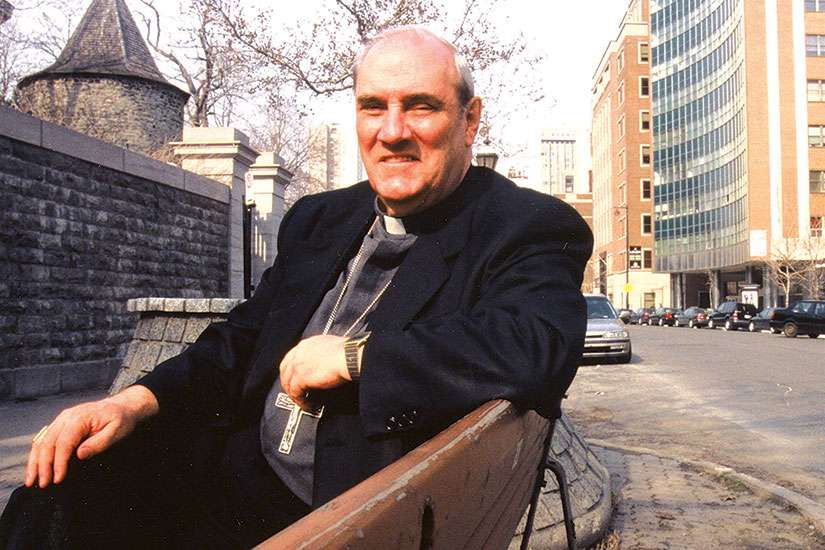Cardinal Jean-Claude Turcotte, Montreal’s popular archbishop for 22 years, died April 8 at the l’Oasis de Paix Palliative care unit in Montreal. A diabetic, the cardinal’s health had been in decline for several months and he was moved to palliative care on March 24. He was 78.
It would be presumptuous to suggest I knew Cardinal Turcotte well, but as a Montreal journalist and sometimes lector in my parish, we often crossed paths at receptions or at news conferences or in a sacristy after Mass. I would run into him at soup kitchens, blood donor clinics and I once saw him at a shelter for homeless teens joking with youths who probably had no idea who they were talking to.
The cardinal was a down-to-earth cleric. He took a genuine interest in those on the margins of society. He worked to expand the role of the laity and, in particular, promoted an expanded role for women in the Church.
“Women can exercise a lot of responsibility that doesn’t require them to become priests,” he said.
Cardinal Turcotte was “Quebecois de souche,” from old stock. He could trace his roots to an illiterate miller, Abel Turcault, who arrived from France in 1662 and settled on Ile d’Orleans. The cardinal was proud of his ancestry and proud of his modest, blue-collar background. In some respects, he never left his working class, east-end Montreal neighbourhood.
He was a “worker priest,” as comfortable serving meals to the homeless as dispensing communion to the faithful. He was a cardinal who occasionally cursed in English — because French swear words are blasphemous — and he could not resist chocolate eclairs to satisfy a sweet tooth.
“I am not a scholar. I am a simple priest,” he once said. “I became a priest because I wanted to work among the poor and the underprivileged, not because I wanted to wear fancy robes.”
Or, as Halifax Archbishop Anthony Mancini, put it: “He was a home boy, not a Rome boy.”
A product of the Christian Workers Movement, he was ordained in 1959 and consecrated a bishop in 1982. He helped organize Pope John Paul II’s visit to Quebec in 1984 and succeeded Cardinal Paul-Emile Gregoire as Archbishop of Montreal in 1990. He was made a cardinal in 1994 by John Paul II and participated in the elections of Pope Benedict XVI and Pope Francis.
For many years Cardinal Turcotte wrote a regular column in the Journal de Montreal. He appeared on television, often with talk show hosts who could barely disguise their disdain for the Church. He always handled himself well in front of the camera and gave as good as he got. He said he was convinced that through the media a bishop “can reach and teach the greatest number of people.”
When he became archbishop of what then was Canada’s most populous diocese, Cardinal Turcotte had to confront the reality of dwindling congregations and shrinking budgets, which resulted in merged parishes. His major initiative was to convert church property into low-cost housing developments, community centres or, in one case, into a palliative care facility. When the Quebec government abolished the confessional school system and banned religious instruction in schools, Cardinal Turcotte saw to it that catechism was taught in parishes.
Quebec being Quebec, he straddled two cultures and became a master politician. He was the first cardinal to allow English-language passages to be used in the French-language liturgy of the Mass. On at least one occasion he alienated some English-speaking Montrealers when he stated that Quebec, not the Supreme Court of Canada, would decide Quebec’s future.
In 2008 he returned the Order of Canada medal he received in 1996 rather than share the distinction with abortionist Henry Morgentaler, a man he described as a “questionable” person who “cheapens the order.” But Cardinal Turcotte waited six months to renounce his medal so he could foist the abortion debate into that year’s federal election campaign.
He was once blindsided by a group of dissident priests who published an open letter calling on the Church to be more accepting of homosexuals. Cardinal Turcotte was willing to open a dialogue, saying dissent is not unusual and that 19 priests did not constitute a schism. But he cautioned that while the Church accepts and welcomes everyone, not everything people do is welcome.
“The Gospel consists of some very beautiful teachings, but it also consists of some very demanding teachings.”
Cardinal Turcotte was a dedicated Montreal Canadiens fan and often used hockey parlance in his homilies. When Brother André was made a saint, for example, Cardinal Turcotte described him as “The Rocket Richard of Miracles.” Two seasons ago the cardinal approved a newspaper advertisement that urged fans to pray for a playoff berth for the Canadiens.
In his final months, Cardinal Turcotte suffered from bouts of depression and mood swings. The recent Supreme Court decision in favour of doctor-assisted suicide left him especially despondent.
There was nothing aloof about him. He was the first to suggest he was not among the Church’s great intellectuals or theologians.
“For me, humility is truth, the truth about who I am and accepting my limitations,” he said. “I am good at some things, and not at all good at others.”
Related articles:
- Crowd gathers early to pay final respects to Cardinal Turcotte, by Alan Hustak
- Cardinal Turcotte remembered for his 'joie de vivre', by Jean Ko Din, The Catholic Register
- Cardinal Jean-Claude Turcotte dead at 78, by Catholic Register Staff


